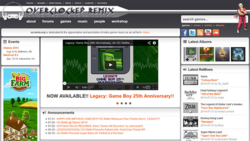OverClocked ReMix

The OverClocked ReMix homepage in mid-2014, showing the latest ReMixes arranged soundtracks from several Game Boy titles
|
|
|
Type of site
|
Video game music tribute site |
|---|---|
| Owner | OverClocked ReMix, LLC |
| Created by | David W. Lloyd (djpretzel) |
| Revenue | Non-commercial |
| Website | ocremix |
| Alexa rank |
|
| Commercial | No |
| Registration | No |
| Launched | December 11, 1999 |
| Current status | Active |
OverClocked ReMix, also known as OC ReMix and OCR, is a non-commercial organization dedicated to preserving and paying tribute to video game music through arranging and re-interpreting the songs with new technology and software, as well as by various traditional means. The primary focus of OC ReMix is its website which offers thousands of free fan-made video game music arrangements, information on game music and composers, resources for aspiring artists, and a community forum for video game music fans.
The webmaster of OverClocked ReMix is David W. Lloyd (a.k.a. djpretzel), who coined the word "ReMix" to refer to interpretive arrangements, as opposed to a remix which typically involves alterations to master recordings. Ambiguity regarding the term ReMix is unintentional, since the organization is dedicated to distinctive rearrangements of video game themes, not to arrangements involving changing minor details or plagiarizing the work of others.
OverClocked ReMix was founded by David W. Lloyd, using the screen name djpretzel, on Devember 11, 1999. Lloyd, who had just created an arrangement of the title theme from Phantasy Star III: Generations of Doom titled "Legacy", created the "DJ Pretzel's OverClocked ReMix" database as a way to host and share it and other arrangements and remixes of his. The name was taken from OverClocked, a webcomic about playing and emulating video games Lloyd was working on. "ReMix" was a term he invented to distinguish interpretive arrangements from a remix which typically involves alterations to master recordings. Over the next few months, Lloyd began adding arrangements from other artists.
At the time, there was a mixing scene that focused only on Commodore 64 music, with an electronica emphasis, but I love arranging, and I wanted an outlet where I could hone my skills while encouraging others to branch out and do the same. From the very beginning, the intent was to encourage games from all platforms, arranged in as many musical genres as possible. That’s what made us different – that was the 'big idea.'
...
Wikipedia
